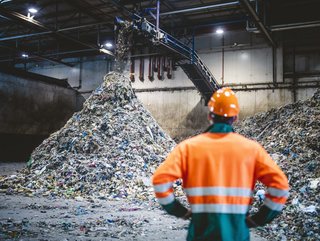The circular economy: Beginning with an ending

The harrowing news about the environment over the last few decades has taught the human race a dangerous lesson about the finiteness of resources. Since the Industrial Revolution kicked off in the 18th century, there has been a rather linear approach to resources: ‘take-make-waste’. Not only does this lead to the depletion of resources, it also leads to the pollution of the planet.
Now, we see that this approach is not sustainable and that we need to rethink our approach. Into this fray, then, comes the notion of circular economy, following an alternative pattern: ‘make-use-reuse-remake-recycle’. This is a system that values the preservation of value in energy, labour, and material. Naturally, such a radically different approach will alter the design of products. The notion of reusing an object may seem intuitive when it comes to objects, but what about the primary source materials? And what of chemicals? What of plastics?
Chemicals are, for starters, a tricky one. In 2022, the International Energy Agency announced that the chemical industry was the third-largest industry subsector in terms of contributing direct CO2 emissions. One must remember, too, chemicals are an essential ancillary part of nearly every other industry. The need to become sustainable is ever-pressing, for if chemicals become more sustainable, so too does every industry that uses them.
To get some answers, Sustainability Magazine spoke to Anahita Khanlari, PhD, the Industry Marketing Director for Chemicals at AspenTech, which is a consultative outfit seeking to provide digital solutions for sustainability issues.
Seeking digital solutions
Khanlari was forthright about the benefits inherent in bringing circular economy notions to the plastics industry: “There are a raft of benefits that organisations across the chemical industry can attain from adopting circular industry best practices. We are already seeing some of these benefits play out. In general terms, through new innovative designs or readjusting existing assets, waste is reduced and emissions are lowered throughout the entire process. Virgin materials’ use is lowered, so fewer natural resources are consumed overall.”
This approach to chemicals is not without its challenges, of course – we are, after all, talking about chemicals here.
“Many organisations find that much of the material they consume is neither accessible for recovery nor recycling since the chemicals are either dispersed in the environment or unable to be separated from the final product.”
AspenTech enables the possibility of a circular economy in the chemical industry through its digital solutions – an approach that helps the bottom line, too. Said Khanlari: “AspenTech delivers a wide range of digital solutions to help accelerate circular economy adoption. Our digital twins, for example, can be leveraged to model new processes for waste recovery and optimise energy use.
“Predictive and prescriptive maintenance tools help drive up asset utilisation and minimise waste by predicting asset failure, which leads to lost revenue and generates interim waste.
“Our machine-learning-enhanced engineering models (i.e. hybrid models) are extensively used to revisit processes with unknown operational variables (e.g. kinetic constants) to reduce by-products’ generation or optimise heat recovery.
“Our industrial data foundations can be used to contextualise real-time data to draw meaningful trends from historical operations, minimising waste. They can, for example, help to attain better visibility of supply chains to achieve autonomous inventory/production management while lowering waste and the operation’s carbon footprint.”
Ensuring the plastic economy becomes circular
Plastics are a slightly different proposition compared to chemicals. Already, plastics have an established reputation as the bête noir of all things sustainable, with 460mn tonnes produced worldwide, yet just 10% of this is recycled. Furthermore, 99% of plastics are fossil sourced and their use in the context of economic growth is expected to triple by 2060. Indeed, plastics are one substance whose economy must become circular.
Carbios is a French company that’s making this happen. It is a green biotech company specialising in making enzymatic solutions for recycling plastics and textile polymers. It has already worked, or established partnerships, with some of the most recognisable brands in the world, among these being L’Oreal, Nestle Waters, PepsiCo, Patagonia, and Puma. Emmanuel Ladent – CEO since 2021 – told us what Carbios can do to encourage a circular economy of plastics.
“At Carbios, we have created two disruptive technologies reaching industrial and commercial scale: the biorecycling of PET (the second most widely used plastic found in packaging, bottles, and textiles) and the biodegradation of PLA (a biosourced plastic). Both technologies rely on enzymes to degrade plastic, an example of which is Carbios’ biological recycling of PET, relying on enzymes that breakdown PET into its molecular components.”
Expanding upon this, Ladent noted how the technology could be used to enable the recycling of plastics with an end to making it a product of the circular economy: “Our innovative, biological, PET-recycling technology has the potential to be a game changer in the fight against plastic pollution. Brands in the packaging and fashion industries are looking for new technologies to reduce their products’ environmental footprint and source sustainable raw material. Carbios’ technology enables them to reduce their dependence on fossil-sourced PET and instead use recycled PET (r-PET) made from plastic and textile waste. Carbios’ biotechnology paves the way for true circularity of PET, as plastic or textile waste can be recycled to once again become virgin-like, quality PET – for example, a t-shirt can become a t-shirt again.”
The challenges in implementing might be there, but the rewards are vast. Though there are indeed many players in the value chain, with such technology properly implemented, plastic pollution may very well be considerably ameliorated, allowing for a sustainable circular economy as we move forward.
- Nestlé's Mission to Boost Sustainable Cocoa FarmingSupply Chain Sustainability
- Unilever’s Global Strategy for Reducing Supply Chain PlasticSustainability
- Stella McCartney: forging the future of sustainable fashionSustainability
- Amcor, Delterra, Mars & P&G partner to tackle plastic wasteSustainability






